A revered, conflicted and undeniably significant figure in the Indian imagination, Ambedkars ideas continue to infl uenceand have resonancein India today. In the three speeches and one essay featured in this book, we witness the eloquent conviction with which he thought and spoke about issues that were of deep concern to himthe position and protection of the Dalits in the about-to-be formed nation; the communal question and proportional representation in the constituent assembly and government services; and the achievement of freedom and the survival of democracy.
B.R. Ambedkar
C. Rajagopalachari
Periyar E.V. Ramasami
WORDS
OF
FREEDOM
IDEAS OF A NATION
B.R. AMBEDKAR

PENGUIN BOOKS
Published by the Penguin Group
Penguin Books India Pvt. Ltd, 11 Community Centre, Panchsheel Park, New Delhi 110 017, India
Penguin Group (USA) Inc., 375 Hudson Street, New York, New York 10014, USA
Penguin Group (Canada), 90 Eglinton Avenue East, Suite 700, Toronto, Ontario, M4P 2Y3, Canada (a division of Pearson Penguin Canada Inc.)
Penguin Books Ltd, 80 Strand, London WC2R 0RL, England
Penguin Ireland, 25 St Stephens Green, Dublin 2, Ireland (a division of Penguin Books Ltd)
Penguin Group (Australia), 250 Camberwell Road, Camberwell, Victoria 3124, Australia (a division of Pearson Australia Group Pty Ltd)
Penguin Group (NZ), 67 Apollo Drive, Rosedale, North Shore 0632, New Zealand (a division of Pearson New Zealand Ltd)
Penguin Group (South Africa) (Pty) Ltd, 24 Sturdee Avenue, Rosebank, Johannesburg 2196, South Africa
Penguin Books Ltd, Registered Offices: 80 Strand, London WC2R 0RL, England
First published by Penguin Books India 2010
Anthology copyright Penguin Books India 2010
All rights reserved
While every effort has been made to trace copyright holders and obtain permission, this has not been possible in all cases; any omissions brought to our attention will be remedied in future editions.
ISBN: 978-01-4306-897-6
This digital edition published in 2011.
e-ISBN: 978-81-8475-190-1
This e-book is sold subject to the condition that it shall not, by way of trade or otherwise, be lent, resold, hired out, or otherwise circulated without the publishers prior written consent in any form of binding or cover other than that in which it is published and without a similar condition including this condition being imposed on the subsequent purchaser and without limiting the rights under copyright reserved above, no part of this publication may be reproduced, stored in or introduced into a retrieval system, or transmitted in any form or by any means (electronic, mechanical, photocopying, recording or otherwise), without the prior written permission of both the copyright owner and the above-mentioned publisher of this e-book.
Contents

Introduction
Bhimrao Ramji (Babasaheb) Ambedkar (14 April 18916 December 1956) was a nationalist and political leader; philosopher, historian and economist; and orator and prolific writer. He was also a jurist and the chief architect of the Indian Constitution. Born into the Mahar community which was considered untouchable, Ambedkar spent his whole life fighting against social discrimination, and advocating political rights and social freedom for Dalits. Against great odds, he was one of the first Dalits to obtain a college education, and he earned multiple doctorates in law, economics and political science from Columbia University and the London School of Economics.
A revered, conflicted and undeniably significant figure in the Indian imagination, Ambedkars ideas continue to influence and have resonance in the India of today. In the three speeches and one essay featured in this book, we witness the eloquent conviction with which he thought and spoke about issues that were of deep concern to himthe position and protection of the Dalits in the about-to-be formed nation; the communal question and proportional representation in the constituent assembly and government services; and the achievement of freedom and the survival of democracy.
For a man torn between allegiance to people who have been oppressed relentlessly for centuries and allegiance to India, the very country that had abetted in the perpetuation of intolerance, Babasaheb Ambedkar admirably manages the ethically difficult and complex balancing act.
IF DEMOCRACY DIES, IT WILL BE OUR DOOM
ADDRESS BY DR AMBEDKAR AT THE ALL-INDIA DEPRESSED CLASSES CONFERENCE HELD AT NAGPUR
18 JULY 1942
Mr President, Ladies and Gentlemen,
 I MIGHT AS WELL TELL YOU HOW THE IDEA OF THE HOLDING OF THIS CONFERENCE ORIGINATED. As you will recall, I was called in April last to be present in Delhi to meet Sir Strafford Cripps, who had come to India as an agent of His Majestys Government with proposals for constitutional changes and who was charged with the duty of negotiating with the different political parties in India for the acceptance of those proposals. Before I went to Delhi I had invited representatives of the Scheduled Castes in different Provinces in India to meet me in Delhi for consultation. When I communicated to them the results of my talks with Sir Strafford Cripps we all felt that the proposals Sir Strafford Cripps had brought with him were a death-blow to the interests of the Scheduled Castes. I expressed my views on the Cripps proposals in a statement to the press which I hope you have all read. But it was felt that common and united action on the part of the Scheduled Castes from all over India was a great necessityand that it was only common action that could save us from the impending political doom. This Conference has been the result of the wish expressed by the Scheduled Castes all over India through their representatives who met at Delhi and has therefore the backing of Untouchable India as a whole. That is why we have here present among us representatives of the Scheduled Castes all over India.
I MIGHT AS WELL TELL YOU HOW THE IDEA OF THE HOLDING OF THIS CONFERENCE ORIGINATED. As you will recall, I was called in April last to be present in Delhi to meet Sir Strafford Cripps, who had come to India as an agent of His Majestys Government with proposals for constitutional changes and who was charged with the duty of negotiating with the different political parties in India for the acceptance of those proposals. Before I went to Delhi I had invited representatives of the Scheduled Castes in different Provinces in India to meet me in Delhi for consultation. When I communicated to them the results of my talks with Sir Strafford Cripps we all felt that the proposals Sir Strafford Cripps had brought with him were a death-blow to the interests of the Scheduled Castes. I expressed my views on the Cripps proposals in a statement to the press which I hope you have all read. But it was felt that common and united action on the part of the Scheduled Castes from all over India was a great necessityand that it was only common action that could save us from the impending political doom. This Conference has been the result of the wish expressed by the Scheduled Castes all over India through their representatives who met at Delhi and has therefore the backing of Untouchable India as a whole. That is why we have here present among us representatives of the Scheduled Castes all over India.


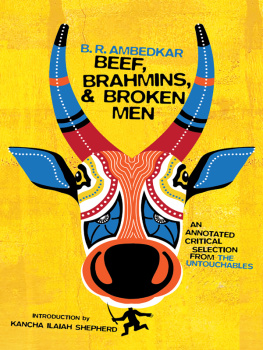
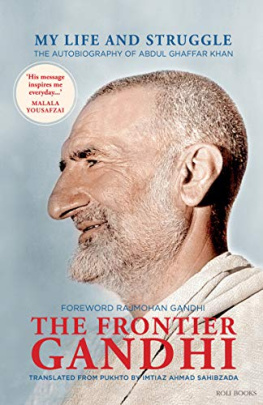
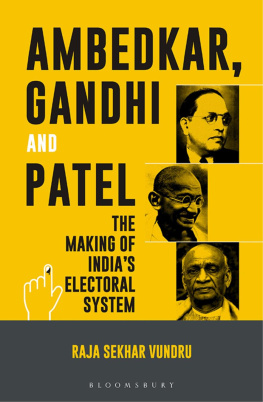
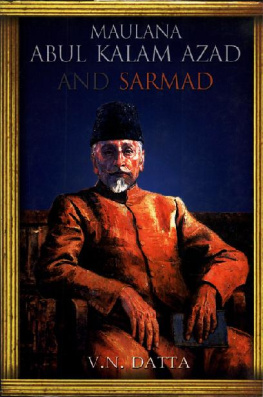
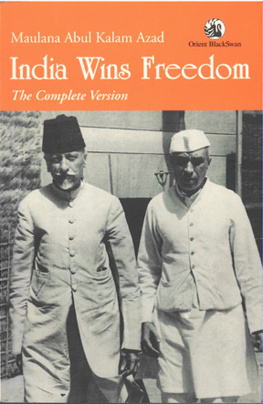
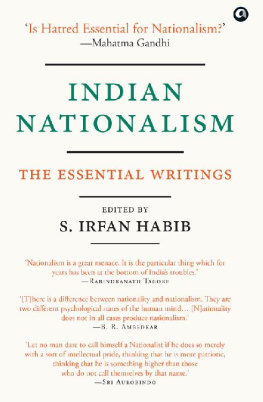
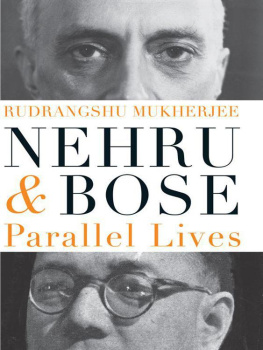


 I MIGHT AS WELL TELL YOU HOW THE IDEA OF THE HOLDING OF THIS CONFERENCE ORIGINATED. As you will recall, I was called in April last to be present in Delhi to meet Sir Strafford Cripps, who had come to India as an agent of His Majestys Government with proposals for constitutional changes and who was charged with the duty of negotiating with the different political parties in India for the acceptance of those proposals. Before I went to Delhi I had invited representatives of the Scheduled Castes in different Provinces in India to meet me in Delhi for consultation. When I communicated to them the results of my talks with Sir Strafford Cripps we all felt that the proposals Sir Strafford Cripps had brought with him were a death-blow to the interests of the Scheduled Castes. I expressed my views on the Cripps proposals in a statement to the press which I hope you have all read. But it was felt that common and united action on the part of the Scheduled Castes from all over India was a great necessityand that it was only common action that could save us from the impending political doom. This Conference has been the result of the wish expressed by the Scheduled Castes all over India through their representatives who met at Delhi and has therefore the backing of Untouchable India as a whole. That is why we have here present among us representatives of the Scheduled Castes all over India.
I MIGHT AS WELL TELL YOU HOW THE IDEA OF THE HOLDING OF THIS CONFERENCE ORIGINATED. As you will recall, I was called in April last to be present in Delhi to meet Sir Strafford Cripps, who had come to India as an agent of His Majestys Government with proposals for constitutional changes and who was charged with the duty of negotiating with the different political parties in India for the acceptance of those proposals. Before I went to Delhi I had invited representatives of the Scheduled Castes in different Provinces in India to meet me in Delhi for consultation. When I communicated to them the results of my talks with Sir Strafford Cripps we all felt that the proposals Sir Strafford Cripps had brought with him were a death-blow to the interests of the Scheduled Castes. I expressed my views on the Cripps proposals in a statement to the press which I hope you have all read. But it was felt that common and united action on the part of the Scheduled Castes from all over India was a great necessityand that it was only common action that could save us from the impending political doom. This Conference has been the result of the wish expressed by the Scheduled Castes all over India through their representatives who met at Delhi and has therefore the backing of Untouchable India as a whole. That is why we have here present among us representatives of the Scheduled Castes all over India.